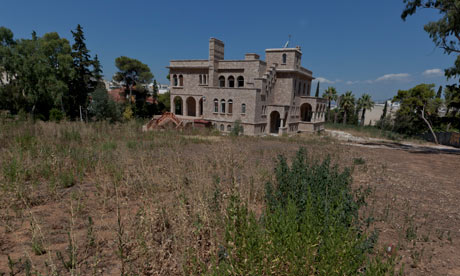An abandoned 19th-century villa has become a symbol in bricks and mortar of dubious public-private deals

Greece in crisis: the abandoned villa at Zografou, Athens, which is at the centre of a row over a development loan. Photograph: Sean Smith for the Guardian
To understand one of the most intriguing stories of the Greek debt crisis you don't need a degree in economics or an expert grasp of Brussels diplomacy – merely a willingness to get a bit muddy.
You start with a cramped 15-minute bus ride out of central Athens to a suburb called Zografou. Uphill past the blocks of flats that make this one of the most densely populated areas in Europe until you come to a fenced-off square. Navigate the bolted gate (clue: a few feet along is a trespasser-shaped hole) and crawl inside into one of the few green patches in the entire neighbourhood.
Just ahead is an abandoned three-storey 19th-century villa, its marble floors and fireplaces and balconies and busts still in good nick. It is magnificent, but spooky – as if the producers of Grand Designs had remade the Blair Witch Project.
It's also at the heart of a controversy that raises questions about howGreece racked up its debt – and whether some loans are illegal.
The essentials appear simple enough: in the early 2000s this estate was designated a communal green, not to be built on. The owners objected but in 2006, before their appeal was settled, the then-mayor led the council into buying half the plot.
According to former mayor Yiannis Kazakos, had the appeal been won some of the plot would have been turned into a shopping mall – a council purchase meant that locals got to exert some control over the development. But some residents say the land has not yet lost its green-belt status so a deal was unnecessary. Either way, to make the acquisition Kazakos' council borrowed €25m (£22m) from Kommunalkredit International, an Austrian bank operating out of the nearby tax haven of Cyrus. And it's claimed that the administration also broke the law, by not getting approval from the state's court of auditors.
It's also asserted that the loan was deemed illegal by the mayor's own officials at the council, who reportedly refused to pay any of the instalments. It was called "illegal" early last month by a government minister. This is disputed by Kazakos, who insists he followed all due procedure.
The upshot is a legally disputed loan. Yet in order to secure another slug of IMF cash this July, Prime Minister George Papandreou was reportedly forced to repay part of the debt owed by Zografou, and another council with an outstanding foreign loan. The details have not been made public, but the deal – IMF cash in return for repaying debts to overseas banks – has been widely reported by the Greek press.
Former mayor Kazakos has moved offices next door to a fishmonger.
Visitors are recieved in front of a 6ft by 3ft close-up photo of their host: heavy eyebrows, a widow's peak and plump cheeks. He's a lawyer at a university in Ukraine, he says, and did nothing illegal. He cites a directive from Brussels that he says exempts purchases with foreign loans.
In Athens, independent lawyers Stathis Chatzopolous and George Katrougalos believe Kazakos hasn't even got the right directive – which in any case doesn't apply to purchases over €1m. They're also shocked at the IMF's insistence that a possibly illegal loan between a council and a bank should be taken on by the state. "In the 19th century, when foreign governments wanted to impose their will they used gunships," says Chatzopolous. "Now they're using the IMF, the European Central Bank and the European community."
Campaigners believe many government loans are either unlawful or "odious", in not serving the national interest. This spring, they formed a campaign for an open audit of Greek state debt. "If this really is public debt, then the public has a right to know where it came from and decide what to do about it," says one of the campaign's founders and economist Costas Lapavitsas.
Meanwhile, the suburb's new mayor, former doctor Costas Kalliris, is facing up to paying a loan worth around €45m over its full term. Ask him what that means for his budget and he reels off a list of cuts: "We won't be able to pay for kindergartens, schools, to make a park … " And Zografou doesn't even have its shopping mall.
• The headline and introduction of this piece were changed at 9.30am on Tuesday 2 August, to better reflect its content
Δεν υπάρχουν σχόλια:
Δημοσίευση σχολίου